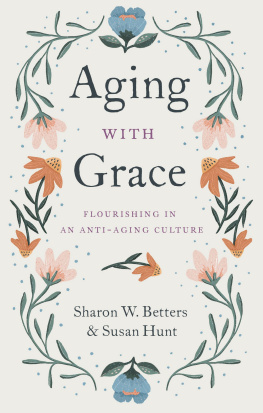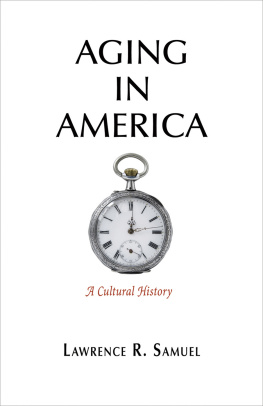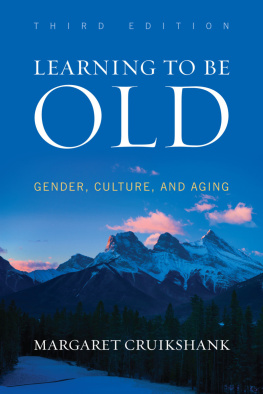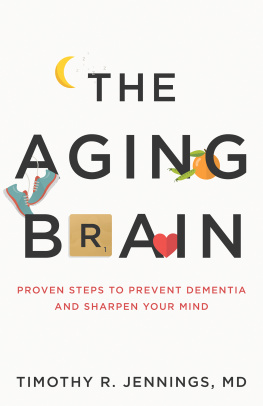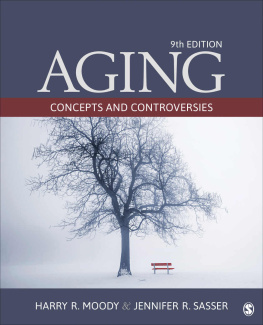Through Japanese Eyes
Global Perspectives on Aging
Series editor, Sarah Lamb
This series publishes books that will deepen and expand our understanding of age, aging, ageism, and late life in the United States and beyond. The series focuses on anthropology while being open to ethnographically vivid and theoretically rich scholarship in related fields, including sociology, religion, cultural studies, social medicine, medical humanities, gender and sexuality studies, human development, critical and cultural gerontology, and age studies. Books will be aimed at students, scholars, and occasionally the general public.
Jason Danely, Aging and Loss: Mourning and Maturity in Contemporary Japan
Parin Dossa and Cati Coe, eds., Transnational Aging and Reconfigurations of Kin Work
Sarah Lamb, ed., Successful Aging as a Contemporary Obsession: Global Perspectives
Margaret Morganroth Gullette, Ending Ageism, or How Not to Shoot Old People
Ellyn Lem, Gray Matters: Finding Meaning in the Stories of Later Life
Michele Ruth Gamburd, Linked Lives: Elder Care, Migration, and Kinship in Sri Lanka
Yohko Tsuji, Through Japanese Eyes: Thirty Years of Studying Aging in America
Through Japanese Eyes
Thirty Years of Studying Aging in America
Yohko Tsuji
Rutgers University Press
New Brunswick, Camden, and Newark, New Jersey, and London
Library of Congress Cataloging-in-Publication Data
Names: Tsuji, Yohko, author.
Title: Through Japanese eyes : thirty years of studying aging in America / Yohko Tsuji.
Description: New Brunswick : Rutgers University Press, [2020] | Series: Global perspectives on aging | Includes bibliographical references and index.
Identifiers: LCCN 2020007180 | ISBN 9781978819559 (paperback) | ISBN 9781978819566 (hardcover) | ISBN 9781978819573 (epub) | ISBN 9781978819580 (mobi) | ISBN 9781978819597 (pdf)
Subjects: LCSH: AgingSocial aspectsUnited States. | AgingSocial aspectsJapan. | Senior centersNew York (State)Case studies. | Older peopleNew York (State)Case studies. | Older peopleSocial conditionsCross-cultural studies.
Classification: LCC HQ1064.U5 T78 2020 | DDC 305.260973dc23
LC record available at https://lccn.loc.gov/2020007180
A British Cataloging-in-Publication record for this book is available from the British Library.
Copyright 2021 by Yohko Tsuji
All rights reserved
No part of this book may be reproduced or utilized in any form or by any means, electronic or mechanical, or by any information storage and retrieval system, without written permission from the publisher. Please contact Rutgers University Press, 106 Somerset Street, New Brunswick, NJ 08901. The only exception to this prohibition is fair use as defined by U.S. copyright law.
www.rutgersuniversitypress.org
To the memory of my parents, Yukie and Hisaaki Tsuji, and my husband, A. Thomas Kirsch
Contents
Life, you never know. I often heard these words at Lake District Senior Center during my initial fieldwork in 19871988. The contexts in which they were uttered varied. Participants at the Center used this expression to note the unpredictability of lifefor example, when they heard of the sudden death of a friend or a peers marriage late in life. They also said it to those facing difficult times, as a way to encourage them to be optimistic or at least open-minded about the future.
Since I finished my doctorate in 1991, two life, you never know incidents occurred that significantly delayed the writing of this book. First, my husband was diagnosed with advanced cancer in 1992. Thus instead of launching my career, I became his full-time caregiver. He went through multiple operations, radiation treatments, and chemotherapy regimens over the next six and a half years until his death in 1999.
Second, after having drafted a few chapters of this book in 2005, I went on the first of a series of long trips to Japan to assist my aging mother. These biannual trips continued for nine years, until 2014. While in Japan, my writing would stop. Though it would resume when I returned home, the frequent loss of momentum greatly slowed the pace of my writing. Consequently, completing this book took more than a decade.
Reflecting back on his life afflicted with serious illnesses, the late Japanese novelist Shusaku Endo said, There is nothing wasteful in life. I agree. The long delays I encountered in completing this book were not a waste. They had many positive influences that compensated for the time lost. For one thing, they broadened the temporal horizon of my work. The three decades of follow-up research allowed me to learn what had become of the elders who had participated in my initial fieldwork. This longitudinal study also opened my eyes to the dynamic aspects of senescence, which is characterized by major transitions, including changes in residence, serious illness, the death of a spouse, remarriage, and divorce.
It is not only my informants lives that have changed. Tremendous transformationsboth major and minorhave swept American society and the world since the late 1980s. When I started my research, no one even dreamed of the ubiquitous presence of digital cameras, cell phones, and personal computers. In the late 1980s, elders at the Senior Center exchanged information about the best deal for film development and used landlines to make phone calls. The Centers office was equipped with typewriters instead of computers. In addition to technological advancements, the culture of aging has also changed. For instance, facilities and services for older people in American society have expanded remarkably, resulting in concomitant changes in peoples perceptions of extrafamilial eldercare, which was once shameful but is now a socially acceptable option.
Furthermore, my experiences as a caregiver for my husband and as his widow, as well as with my mothers senescence and death, have enhanced my understanding of the inevitable age-associated hardships of the participants in this study. Because of my own firsthand experience, I could visualize what it was like when they were hospitalized or had surgery, since my knowledge of American hospitals no longer came from ethnographic descriptions alone. My own experience helped me understand how these elders felt when they or their loved ones were diagnosed with cancer or when doctors told them that all treatments had been exhausted and death was imminent. Elders at the Senior Center and I also shared the sorrow of losing a spouse. Only after my husbands death could I detect the pain a widow was still feeling when she talked about the husband she had lost years earlier, recognizing the grief buried in her matter-of-fact tone.
Being a caregiver for my mother gave me an opportunity to observe various aspects of Japanese hospitals (e.g., doctor-patient relationships, nurses roles) and Japanese attitudes toward terminal illness and death. I was also exposed to Japans single-payer medical insurance and long-term care insurance systems for senior citizens. Neither generated the tedious paperwork Americans face after major illnessesthe large piles of insurance statements and medical bills. However, above all, looking after my mother in Japan did not just inform me of these cultural differences; it also made me realize the similarities in the panhuman experiences of illness, old age, and death.



